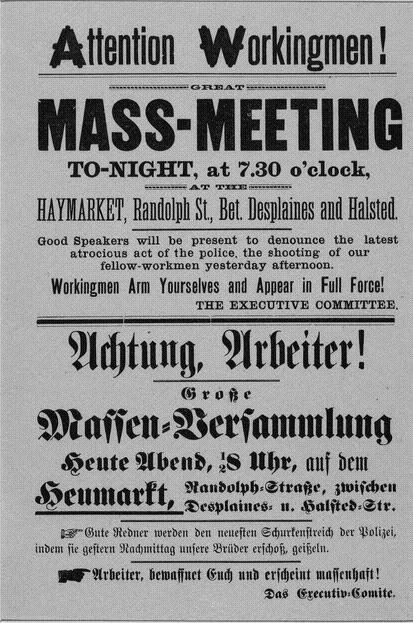“The Terror Last Time,” my article about the 1886 trial of Chicago’s Haymarket anarchists, which is in part a review of James Green’s new book Death in the Haymarket, is published in the 13 March 2006 New Yorker. As it happens, there are many Haymarket resources on the web, so I thought I’d link to a few of them. What follows will seem a little scattered unless you read my article first (ahem), but if you’ve done that, then . . .
If you want to read the witnesses’ testimony yourself, the Chicago Historical Society has published the trial transcript in the Haymarket Affair Digital Collection. The collection has all sorts of neat tidbits. If you thought my description of Louis Lingg’s beauty was a bit too breathless, for example, you can judge for yourself here. If you want to see exactly how nut and bolt screwed together to make a bomb, look here, for a bomb allegedly Lingg’s. The historical society also collaborated with Northwestern University to create Dramas of the Haymarket, a sort of online guided tour of the archival holdings.
The 2003 re-analysis of the Haymarket bomb fragments and evidence was described in this article by Timothy Messer-Kruse, James O. Eckert Jr., Pannee Burckel, and Jeffrey Dunn in a 2005 issue of the journal Labor: Studies in Working-Class History of the Americas.
The night before Parsons, Spies, Engel, and Fischer were hanged, Parsons sang the Scotch ballad “Annie Laurie.” There’s no recording of Parsons himself singing it, but there’s a period recording of the song by the Edison Male Quartette in the UC Santa Barbara Cylinder Preservation and Digitization Project. As I mention in the article, the next morning, just a few hours before they were hanged, the men sang the “Workers’ Marseillaise” together. The three German speakers may well have sung in German, and I strongly suspect that that’s what’s being sung in this period recording. I’m not sure, though, because my German comprehension is extremely poor; it’s the right tune, certainly, and someone has catalogued it under the title Arbeiter, i.e., “workers.”

